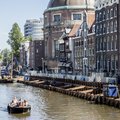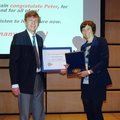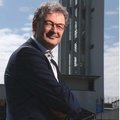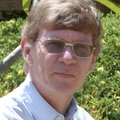Archief
07 juni 2022
Onderzoek TU Delft CiTG naar kademuren en bruggen gehonoreerd door Nationale Wetenschapsagenda

Binnen de Nationale Wetenschapsagenda (NWA) call ‘Bruggen en kademuren in stedelijk gebied’ is een van de onderzoeken gehonoreerd. Associate professor Mandy Korff werkzaam bij TU Delft, Civiele Techniek en Geowetenschappen (CiTG) en Deltares, leidt het onderzoek ‘live insights for Bridges and Quay walls,’ afgekort ‘LiveQuay’.
07 juni 2022
Onderzoek TU Delft CiTG naar kademuren en bruggen gehonoreerd door Nationale Wetenschapsagenda
03 juni 2022
Adriaan van Natijne in KIJK

Nederlands onderzoek behoort tot de wereldtop. Daarom laat KIJK-redacteur Laurien Onderwater je in deze rubriek elke maand kennismaken met een wetenschapper van eigen bodem. Deze keer: Adriaan van Natijne onderzoekt of je aardverschuivingen kunt voorspellen vanuit de ruimte.
31 mei 2022
Vening Meinesz Medal 2022 voor Peter Teunissen

De European Geosciences Union (EGU) heeft de Vening Meinesz Medal 2022 toegekend aan professor Peter Teunissen (GRS), voor zijn baanbrekende en invloedrijke wetenschappelijke werk, variërend van fundamentele geodetische theorie tot baanbrekende innovaties op het gebied van modellering van Global Navigation Satellite System en nauwkeurige plaatsbepaling.
31 mei 2022
Hans Ramler benoemd als TU Delft Fellow Construction Technology

Het College van Bestuur heeft Hans Ramler benoemd als TU Delft Fellow Construction Technology bij de faculteit Civiele Techniek & Geowetenschappen (CiTG).
30 mei 2022
Geothermische bron op campus TU Delft stap dichterbij

De urgentie van de energietransitie neemt elke dag verder toe. De CO2-uitstoot moet in 2030 met 55% verminderd zijn ten opzichte van 1990 en 1,5 miljoen huishoudens moeten dan aardgasvrij zijn. Dat vraagt om concrete actie. Zo’n tien jaar geleden kreeg een groep TU Delft studenten het idee om een geothermische bron op de universiteitscampus te boren. Wat eerst een wild plan leek, werd in gang gezet toen bleek dat de campus een ideale plek voor geothermie was.
27 mei 2022
Vening Meinesz Medal is awarded to Peter J. G. Teunissen

The 2022 Vening Meinesz Medal is awarded to Peter J. G. Teunissen for pioneering and influential work ranging from fundamental geodetic theory to breakthrough innovations in Global Navigation Satellite System modelling and precise positioning.
24 mei 2022
Klimaatverandering ook meetbaar door het geluid van gletsjers

In de winter zijn de gletsjers stil. Maar in de zomer blijkt dat ze infrageluid opwekken door afkalvend ijs en smeltwater. Het gaat om een zogenoemd infrageluid dat onhoorbaar is voor de mens, maar wel wordt opgepikt door fijngevoelige meetinstrumenten.